|
Interview conducted September 29 2013 Interview published October 13 2013 |
Germany's very own pirate captain Rolf Kasparek, a.k.a. Rock'N'Rolf, released a new Running Wild album a few days ago. Metal Covenant hooked up with Rolf 10 days earlier to talk about the album, the future, tours, etc.
![]()
Tobbe: Tell us about your new album, Resilient. What are your feelings this close to its release?
-
Rolf: I'm really proud of the new album. It turned out great. I'm really satisfied with the production and everything. We had so much time to work this out, to work on little bits and pieces and everything, you know. We have great songs on that in the first place and I've got really good reviews on the album so far. Really good ones, so I'm really satisfied today.
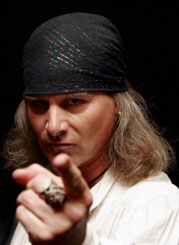 Tobbe:
Yes, I bet you are. With this album you have a more classic Running Wild
sound, with the riffs and the melodies. It's like going back to the nineties,
but there's also stuff that sounds like your recent releases. Is this
something you truly wanted or is this something made to please the fans
to get Running Wild back on track again?
Tobbe:
Yes, I bet you are. With this album you have a more classic Running Wild
sound, with the riffs and the melodies. It's like going back to the nineties,
but there's also stuff that sounds like your recent releases. Is this
something you truly wanted or is this something made to please the fans
to get Running Wild back on track again?
-
Rolf: To be honest, I really can't take any control of that when I'm writing. I was just writing the songs and it turned out that the ideas I had were going into that kind of direction. I just figured that out when I did the demos for them. If I had to say to myself that I have to write songs like this or like that, it would become bullshit out of that. It wouldn't work. You really can't write what you don't feel and when the feeling is right it's great, you know.
Tobbe: To me this record is like a bridge between new and old Running Wild.
-
Rolf: Yes, absolutely. It's exactly what I wanted to do. The songs with new things have been added to the sound of Running Wild, you know with the harmony vocals and the choruses, which we never didn't have before Shadowmaker. It's a big part of the music and you can play around with that and do a lot more different things with that, you know. I think it adds something good to the sound of Running Wild.
Tobbe: When you started to write songs for the album, how did you get into writing mode and how do your songs progress from an embryo to something recordable?
-
Rolf: Well, it's very different, you know. Sometimes it's the melodies first and sometimes a different riff, so to speak. Sometimes I've got an idea for a song, like with Bloody Island. I had something on my mind about that that I just put down. On the album you will hear a different thing, as I threw away the original idea, you know. It's a benefit to the new idea I had, which is the song now. It's pretty much different, you know. It's pretty hard to say.
Some of the songs have written themselves. I was writing on one of the tracks, I can't remember which it was, and immediately I had the idea for Soldiers Of Fortune. I put down all the ideas I had and it was about 5 or 10 minutes and the whole song was there. I just put it down on tape and tried not to forget, just bits and pieces, you know, and I went back to the song I originally was working on. When I listened to the tape later, it just took me a day to record everything, with the proper guitars and writing the vocals and thinking about what I would do with this and that. But the main idea for the song was still there.
Most of the songs came around in a very short period of time, you know. It was a really relaxed situation when I was working, you know when I was writing the songs. And I had so much more things that I couldn't use anymore. I remember recording the guitars for the real production and I really had to put down 4 more song ideas I had on tape to not forget them.
Tobbe: So what did the record company say when you presented this record that had classic Running Wild riffs?
-
Rolf: They were absolutely blown away. They were like "Wow, this is much better than we expected. We're really glad to see this album and this is going to the right direction".
Tobbe: Cool. That must have felt good.
-
Rolf: Yes, absolutely.
Tobbe: Why did you decide to call the album Resilient?
-
Rolf: The title was there very early, you know. 2014 means 30 years from our first album Gates To Purgatory and it means 35 years of Running Wild and it's a long, long time. If you see down that long, long time, even if it was a break for a few years, the band was there. Surely this project must be resilient in a way. It was also where the idea for the cover came from, you know. I just thought about what could be resilient and it was Adrian, because he was always around since the day we started Running Wild. He was there, you know. He wasn't on all covers, but he always appeared again throughout all the time, throughout the last 30 years, you know, so that's why I said that it could be great to put him right in the storm. He makes his way through the storm and don't move away from the direction that you wanna go. It's exactly what I do and what Running Wild is about, you know. It's why the idea fitted perfect to the album.
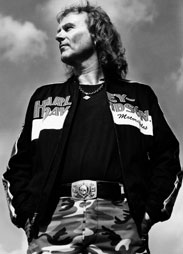 Tobbe:
You mentioned your earlier days. What was your main goal when you started
the band?
Tobbe:
You mentioned your earlier days. What was your main goal when you started
the band?
-
Rolf: The funny thing is that when I first started playing guitar and founding a group with school mates, you know when it was called Granite Heart, I never doubted to become a rock star. I just thought about when it would be. Then we changed the name to Running Wild and got more professional, even if we were not professionals.
Tobbe: That's a good spirit you had.
-
Rolf: You know, when I look back now, it was the right way to think, to reach this goal. Some people would say that I was crazy and what else, you know. But there was no other way to make it and I had the passion to do this, so I never doubted.
Tobbe: Running Wild has been a soloband for a long time now. Do you ever miss the period when you were a band?
-
Rolf: No, not really. It was great when we started the band, because this project was formed as a band and it was a band in the early days. It didn't become a solo project from one day to the other. It was really a kind of creeping process for a decade or something like that. Today I just took the advantage of that and I can really do what I feel is right and I don't have to discuss anything like we did in the earlier days, so it makes it more easy for me for sure.
Tobbe: Let's go back to the new album for a while. You were talking about the production earlier. A long time ago the production of Running Wild records were dirty and heavier, I must say. But nowadays you have a pretty clean production. How do you see it?
-
Rolf: It's a different way of producing, you know. Because in the early days when we did some of the records, we didn't have the money to stay very long in the studio. If we look back at Gates To Purgatory, we had a 16 track machine and we had 16 days to do the record. Today we have just started with the production in 16 days, so that's why it's pretty much different and today we really got the time.
We work in 3 different studios and I've got a studio in my own house where I record the vocals and then my guitars. It makes it much more easy to work on things and try out different things, even if you don't use it, you know just to try it out. We never had the time back then to do this. We just did what we had prepared. Put it down on tape, mix it, fine you know.
Tobbe: Do other people than I say that the production may be too clean for Running Wild or is it only me?
-
Rolf: No, I wouldn't say. I think it's very powerful and the guitar sound is great. It's pretty much hard to see. You also have to see that I'm a different person than I was 20 years ago. Things are changing. That's the problem, you can't ever hold something forever. It doesn't work, you know.
Tobbe: Is this a band or project nowadays, if you see what I mean?
-
Rolf: It's a project, but when it comes to life, the 4 guys that go on stage are the band, for sure. That's not me and some musicians. It's a real band. We prepare as a band and play as a band. I just divide us in two different parts, you know. What we do in the studio where I hire musicians for things I can't play myself, whom I think should be the right one to do the song, or something like that. The other guys are the parts that play for me live. The only exception is PJ [Jordan] of course, because he is part of the production team, so he recorded some of the solo guitars, you know.
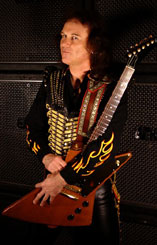 Tobbe:
So how far in the future do you have plans for Running Wild? Are you taking
this year by year or will this continue forever?
Tobbe:
So how far in the future do you have plans for Running Wild? Are you taking
this year by year or will this continue forever?
-
Rolf: It's hard to say. I would say that I'm going from one step to the other. I will do it as long as I enjoy it the way I'm enjoying it today, you know. That's why I plan to maybe do some festival shows next year. We also wanted to do it this year, but it was not possible, because of the production. We were in the studio when all of the festivals ran all over Europe. This is the plan, you know. We also talked once about doing a second Giant X album. We have to think about when the next Running Wild production will start out with the writing process and everything. We have to make up our minds concerning the running of the next 1,5 or 2 years or something like that, you know.
Tobbe: You mentioned Giant X and a second album. Will we hear anything more from that project?
-
Rolf: We would like to do that, you know, because PJ has some songs and I have some songs. But we just talked about it once and that was when we started out with the plans and everything for Resilient. When I get through all this stuff and promotion for Resilient, then we can talk about the next thing, so one step after the other.
Tobbe: Okay. So no more Toxic Taste then?
-
Rolf: It would be pretty much different to do these two productions in a row. It would be a real problem, you know, but I would never say never. As it looks today, it could be a time scheduling problem.
Tobbe: We were talking about festivals earlier. Will there be any gigs at all besides the summer festivals?
-
Rolf: Yeah, you know, that was the plan, because Running Wild won't be doing any touring anymore. We'll do festivals and we got a lot of offers for a lot of festivals all over Europe, all over the world, so to speak. We will go through this when I've finished all the promotion for Resilient and the next step will be to think about what we will do with the live thing, you know. What kind of festivals we'll play. We look forward to that. It's pretty much different offers from all festivals. I'll have to see.
Tobbe: What about the lineup? Have you given it any thoughts yet?
-
Rolf: PJ would definitely play and we will see if the 2 guys [Jan S. Eckert and Matthias Liebetruth] who played the last time for me in Wacken would do the shows. I don't know. We'll have to see, but PJ would definitely be there.
Tobbe: I saw that show by the way. I was down there and it was a good time and the audience was so excited, because this was Running Wild's last gig, supposedly.
-
Rolf: Yes, Wacken was a great show. The people were standing in the rain and the cold. It was the worst surroundings to a show, I have ever had. The people was so good and they were singing so loud to the songs and they were so enthusiastic about the band and everything, so it was really a great night, you know.
Tobbe: I remember you guys soundchecking for a long time earlier that day.
-
Rolf: It was really hard, you know. When I was singing and I was standing by the microphone, I was really standing in the rain, because the wind was so heavy that all the water was coming straight ahead to the stage. When I was standing there I was wet all the time, so it was really hard to sing when you keep getting water in your face. Not pretty much fun.
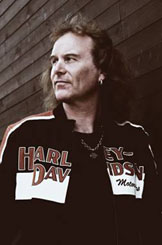 Tobbe:
Still you guys did a good gig, I tell you that.
Tobbe:
Still you guys did a good gig, I tell you that.
-
Rolf: Well you know, to be professionals is the way, for sure. But I can imagine better conditions to play in. Like in 2003 when it was great in Wacken. Pretty warm and not too much wind and everything. It was great, you know. But it is what it is, you know. But it was a great show and to see the people standing there and not leaving, even though it was raining. It was so fucking cold, but nobody was going home or back to the camp or something like that, you know. It was great.
Tobbe: What songs will you play next summer then? Have you considered what to play yet? Will it be a kind of best of-set or will you mix new and old stuff?
-
Rolf: It will be a good mixture between everything. We really have to play some of the classics who has always been there, some surprises, some classics we haven't played in a long time. Also some new stuff for sure and we'll play some songs from Resilient. So a good mixture between all that, you know.
Tobbe: You never did long tours and touring never was Running Wild's motto. Most bands that get the opportunity to tour extensively do so, but not you. Why didn't you become a touring band in the eighties?
-
Rolf: It pretty much obvious, because Running Wild has a very expensive show. It's a problem, because people expect that. We did a down scaled version on the Rogues On Vogue tour. It was 5 weeks we did in Germany. A lot of fans came up to me after that and said that this wasn't what we expected Running Wild to be, because there was no pyrotechnics, no big lights and no big stage set. It was nothing there and I said the best way is to do festivals when all the logistics are there and where you can do a big pyrotechnical show. You know, everything is there and the fans are there, so it's a better opportunity for us.
Tobbe: Yes, I get your point. You've had a long career now with both success and periods that haven't been that successful. How do you handle those situations? Let's start with the worst, the periods that haven't been so successful, what went down in your mind then?
-
Rolf: I never thought about that really, because I know that we have so many true fans that has always stuck to the band. So when we sell less copies of an album, it's just normal. Some of the records that fans claim to be very great have sold very bad. One of the albums that sold less is actually Black Hand Inn.
Tobbe: That's hard for me to see, because that one is definitely a top 3.
-
Rolf: Yeah, that's the problem. You know, Blazon Stone is the best sold album of all times, so you really can't see us like that. You really have to see the whole career and what we have reached with the band. It's the better way to see this. The band can never have the same figures or be in the same status. Every album has something to do with where you stand as a person. The mood you are in, the surroundings you have at that time when you're writing and when you're doing the production and everything. So you can't always be the same. That doesn't work and that's why we're human, you know.
Tobbe: When you took that long break from Running Wild after Rogues En Vogue, did you ever consider to quit music? To do something different than music, because you've been in the business for like 35 years now?
(Rolf actually doesn't answer my questions below and I believe he is used to answer questions like "Why did you take a break from Running Wild?" and that's why his answer is as follows. I felt no need to correct him and therefore I just continued the conversation.)
-
Rolf: I figured out in 2006 that I would quit Running Wild. I made it public in 2009, 3 years later, but it was around 2006 when I said enough is enough. I really wanted to do different things and that's why we started out with this kind of fun project Toxic Taste. There was no pressure behind that. There was no record company and we didn't have a date when we had to hand over the tapes or something like that, so we really could do whatever we wanted. That was the way we wanted to go with that, you know.
I really had to say goodbye to Running Wild, when I now look back today. I really had to totally quit, just to find a way back. If I just had taken a break for 1 or 2 years, it wouldn't have worked. I really had to say goodbye to everything. Then when the time was right, when I started the writing process for these bonus tracks album that they have for this project of the re-releases, the new recordings you know, I figured out that the fun was back and that the passion was back. Then I looked back and said that this was the reason why I had to really say goodbye totally. To find a way back in this case, without any pressure, without being forced to do anything, if you know what I mean.
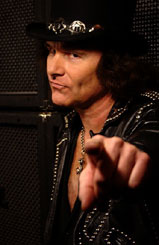 Tobbe:
I totally get your point. If you have a regular day-time job, you sometimes
get sick of that too and you wanna do something else or you wanna quit
that job. You had been doing this for almost 3 decades then, so I see
your reasons and why you decided to do something different.
Tobbe:
I totally get your point. If you have a regular day-time job, you sometimes
get sick of that too and you wanna do something else or you wanna quit
that job. You had been doing this for almost 3 decades then, so I see
your reasons and why you decided to do something different.
-
Rolf: Absolutely. It was the way to do this. The starting point of all this, of coming back, was when I was writing for Toxic Taste. Because I had written 80 songs in 2 months or something like that. The 15 songs on the album Toxification were not the best tracks, they were the 15 first tracks I had written. So there was a lot of more stuff I had written that was way better than the album.
I figured out that this can be writing, okay. The feeling was also there when I did Shadowmaker and it was the same feeling when I did Resilient, because there were so many things I couldn't use, because of time I didn't have, you know. So this is great. It was never like this before. In the earlier days when I wrote an album, I really had these kind of ideas I was working on and what I put on the album were the songs that were there, you know. Today I really can pick the best songs out of that, you know what I mean.
Tobbe: What are your most proud moments on Resilient?
-
Rolf: Well, I really think that Bloody Island is a real classic. I knew that when I was writing the song. Sometimes you have this kind of feeling that you can't describe or you can't explain. I had the same feeling when I wrote Under Jolly Roger and Conquistadores. You have this feeling that it's a classic, you know that. I was so curious about what people would say when they heard the song. It was exactly the way I felt, because everybody tell me that Bloody Island is a classic and that it is a great song, and the album hasn't been released yet.
Tobbe: Running Wild riffs are typical, so when you write a new riff, what do you do to not repeat yourself?
-
Rolf: That's pretty much hard. Sometimes when I'm writing and I've got an idea and that idea seems too familiar to me, I really have to go through all the old albums to find out that it's not a copy of any song I've written before. If you have written this many songs and so many albums, you could easily copy yourself without knowing. Some of the songs have been thrown away, also on the latest records I did, you know, because I accidentally stole from myself. Sometimes it's a problem because you have written so many tracks and you can't have all the tracks in your head. It's not possible. When I pick a song which we never play live, I really have to relearn that one, because I don't know what I did back then.
Tobbe: Well, you're not touring that much and I guess you don't listen to your albums every day either, so naturally you have to relearn stuff when you play it again.
- Rolf: Yes, but most songs that we often play, I just can play like that, you know. It's just there, because I have played some of them for 30 years. When it comes to Bad To The Bone, it's no problem, you know.
Tobbe: That was one of the songs you did on the soundcheck at Wacken, I remember.
-
Rolf: That's always a track for the soundcheck, because it's really great for figuring out the sound itself. We also play Riding The Storm on the soundcheck, because of the very fast double bass and everything and the very fast guitars, so that the FOH-man really can figure out the sound and what's best, you know.
Tobbe: You played Port Royal on the soundcheck as well. I can't believe I remember that.
-
Rolf: Yes, it could have been that, because it was the show's opening track.
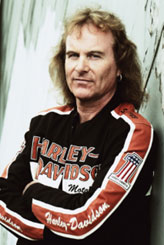 Tobbe:
Well, never mind. You know, Riding The Storm was the first song that really
have what I call a Running Wild intro. Then you had one on The Rivalry,
which is actually one of your best tracks, and also Chamber Of Lies off
Pile Of Skulls, for instance. On your latest albums you don't have those
intros. Will you ever write those bombastic, epic intros again?
Tobbe:
Well, never mind. You know, Riding The Storm was the first song that really
have what I call a Running Wild intro. Then you had one on The Rivalry,
which is actually one of your best tracks, and also Chamber Of Lies off
Pile Of Skulls, for instance. On your latest albums you don't have those
intros. Will you ever write those bombastic, epic intros again?
-
Rolf: It could happen, when the idea comes. It's like to say that to write a song like in the old days. I just can't sit down and say to myself that I have to write an intro, you know what I mean. It wouldn't work. But when the idea is right, I will do it, you know.
Tobbe: A lot of people that don't listen much to Running Wild thinks that the band is just about pirates. Are you sick of that constant connection to pirates, since you have released albums with other historical moments as well?
-
Rolf: No, because it became a trademark. It was never planned by us. It just came out like that through the song Under Jolly Roger and the cover of that record. It just became a part of Running Wild, but I never felt myself forced to write a whole album about that. If you look at an album like Blazon Stone, there's no songs about pirates, not one song. It's the kind of trademark that you can see Running Wild connected with. When they say that there are pirate metal bands, it's great. It's a new genre. If you have a look, there's so many bands outside that tries to copy that or even use that as a trademark for themselves. It's kind of a new trend that's going on, so it makes me proud, because I started that.
Tobbe: Do you have any moments with Running Wild that you are a bit extra proud of?
-
Rolf: When we knew that Running Wild would really make it and to reach the next big step which was around Death Or Glory. We played in the bigger halls, we had more people coming to the shows and we sold so many records then, you know. It was really great. The other was when we played in Wacken 2009, even though it was the last show. To see 150000 standing there, the absolute record for a live show in Germany. This was absolutely fantastic to see the people don't go away because of the rain and the cold and everything. They were standing there until the last note was played, you know. That was really great to see.
Tobbe: Yes, you played Under Jolly Roger and then returned for another encore with Chains & Leather.
-
Rolf: Yes. We really saw that this was so great and that the people really appreciated the band and don't wanted to leave. They were just standing there in the rain, you know. We saw this attitude towards the band and towards the music and that was really great.
Tobbe: Do you have any moments that you're not so proud of, or things you regret?
-
Rolf: You always make mistakes, but those mistakes are leading to other things. If you hadn't made those mistakes, maybe the other things wouldn't have appeared. The first real big thing to us, like with many young bands, was that we trusted our first manager. That was the low point, that was the first part to learn.
![]() See
also: review of the
album Resilient
See
also: review of the
album Resilient
Related links:
www.running-wild.net
www.myspace.com/runningwildmusic
www.facebook.com/runningwildmusic